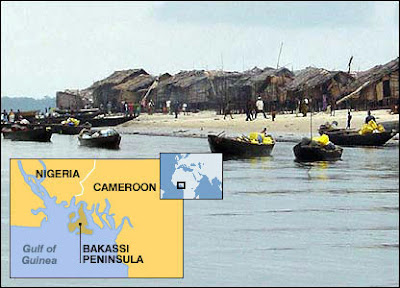Written by the Editorial Board of the Guardian Newspaper
A recent alert that residents of Bakassi Peninsula could face an imminent spectacle of being declared stateless is a sad reminder of how not to have a recourse to political correctness when national interest is clearly at stake. An inexplicable vacillation in resolving the lingering crisis in the area is therefore building up another humanitarian crisis, as citizens in the area have no country to lean on at the moment. It is a paradox of development that the Camerounian government has been exploring oil from the area but the citizens supposedly ceded to the Central African country have been neglected.
The Nigerian government must rise up promptly to tackle the challenges and to provide all necessary support to ‘our people’ wallowing in abject neglect and poverty in the area.
The root of the current stalemate (in Bakassi as elsewhere) was the Berlin Conference, called by Portugal but organised by the first German Chancellor, Otto Von Bismarck. Staged from 1884 to 1885, it came up with the General Act regulating European colonisation and trade in Africa. The Conference Treaty enshrined the principle of effective occupation, causing the scramble for the interior of Africa beyond the coastal trading ports.
Although Germany was a new imperial power, she got the territories of Togoland and the future Cameroun. On losing the First World War, however, Germany was compelled by the Allied nations to sign a punitive Treaty of Versailles (signed on June 28, 1919). It apportioned blame on Germany and seized the land the nation occupied across Europe and assigned all its colonies to France and Britain. France was handed Togoland and East Cameroun while Britain took western Cameroun and administered it with Nigeria.
The link was evidenced in the fact that a major political party in Nigeria was called the National Council of Nigeria and the Cameroun at the time. And then, following a plebiscite after Nigeria became a Republic in 1963, the southern part of the former British ‘colony’ went with Cameroun while the northern part became Nigeria’s Sardauna Province, later Gongola State (and now Taraba and Adamawa states).
The people of Bakassi are in the southern tip of the former British Cameroun. They are Efik-speaking people with cultural and other ties to their kith and kin in Nigeria.
In the intervening years, while Cameroun (supported by France) had her eye on the oil-rich Bakassi Peninsula, Nigeria was not alert to the threat to its eastern territorial borders. Endeavouring to play the role of a “big brother” the giant was oblivious of the determined predatory moves by her neighbour from the eastern frontier. From the military regime of General Yakubu Gowon (1966-1975) to the civilian administration of General Olusegun Obasanjo’s (1999-2007), the matter was handled with careless hand-shakes and gentleman agreement.
This lack of vigilance on the part of Nigeria gave room to incursions by Camerounian gendarmes who terrorised the residents of Bakassi. Attempts at reprisals by Nigerian military resulted in skirmishes. Cameroun took the matter to the International Court of Justice, which ruled in favour of Cameroun in August 2008. Since that date, the landmass became part of Cameroun on paper though the residents remained Nigerian at heart. What is worse, the two countries have never been serious about governance in the area inhabited by the people.
The current plight of the Bakassi people was the subject of the alarm sounded by the Representative for Nigeria and the Economic Community of West African States, Angele Dikongue-Atangana, at a recent signing of a Memorandum of Understanding with ECOWAS Parliament. The timely alarm drew attention to the plight of internal displacement and statelessness in the sub-region. Out of the 10 million people facing statelessness in the world, it is estimated that over one million are in West Africa, mainly in Cote d’Ivoire, with a likelihood of the people of Bakassi being added.
It was stated that the people claim to be Nigerians, but it is not a claim; they are Nigerians. They should not be ignored by the Nigerian government. That is why representatives of the people in Cross River/ Akwa Ibom and Abuja should not close their eyes to the plight of the people.
International agencies now categorise them as “displaced and in danger of not being in a position to prove their legal links with their country nor with Cameroun.”
Confirming the alarm sounded by the international agency, a powerful voice of the Bakassi people, Senator Florence Ita-Giwa recently wailed that, 14 years after the ICJ’s ruling, the legal documents to anchor the ceding to Cameroun are yet to be perfected. At the moment, the people in Bakassi have no country or home they can call their own. That is conceptually tragic. Nor is there any evidence of government’s presence, although they registered with the Independent National Electoral Commission and voted in Dayspring Island. This is more than the usual experience of borderline residents that Professor Anthony Asiwaju has always kept in the consciousness of humanity.
The UNHCR had declared the decade (2014-2024) for combating statelessness. Nigeria must utilise the platform provided by this decade of action, to draw up its strategic plan for the Bakassi area and the people. Those to handle the delicate and urgent assignment must be individuals who know the experience of borderline peoples. In seeking solutions, no options should be excluded. The people of Bakassi have chosen to remain in Nigeria even without a formal plebiscite. Our elders say it is the child that raises its arms that will be lifted up by adults.
The suffering Bakassi people have decided to remain in Nigeria. Therefore, the Federal Government of Nigeria must respect their desire and provide everything that a warm embrace entails. And this should not be delayed at all as Cameroun is only interested in oil exploration in the area without paying attention to the people they also inherited from the United Nations.
(adsbygoogle = window.adsbygoogle || []).push({});


